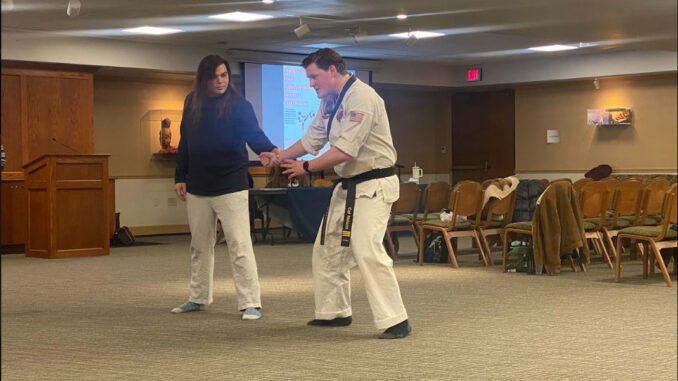
Zach Petroff | Opinions Editor
Feb. 16, 2023
Standing in full Gi, three-degree black belt and karate instructor Cal Nelson found himself in a basic single hand-wrist grab.
“When you’re dealing with a situation like this, there’s one thing that’s really important to know,” Nelson said. “There’s a weak point.”
In one smooth motion, Nelson then made his restricted hand into a fist, used his free hand to grab his fist and quickly made contact with his elbow to his captor’s elbow. The quick motion caused the would-be perpetrator’s wrist to bend, freeing Nelson.
“We’re going to work to exploit [the weak spot].”
Nelson, along with Students Against Sexual Violence (SASV), the Title IX Office, Duquesne Public Safety, the School of Nursing, Pittsburgh Action Against Rape and the Center for Women’s and Gender Studies were part of a panel and workshop on strategies for preventing sexual violence on Monday in the Africa room.
The speakers talked to students about the importance of awareness of sexual misconduct, how to prevent it and what to do if they are victims and the resources that are available.
“It’s really important that we understand for ourselves and for people around us what to do if this happens,” said Associate Professor at the Duquesne school of nursing, Alison Colbert.
“If you experience sexual assault, you have the right to good care, you are worth good care,” Colbert said.
The panel addressed some of the misconceptions that surround sexual assault, including medical care. One of the major myths surrounding victims of sexual assault is that people only need to seek medical care if they are physically injured.
“The considerations vary,” Colbert said. “There’s trauma, there’s emotional response to it. There’s a physical response to it. There is the need for sexually transmitted infection treatment. There are things related to pregnancy.”
Colbert also talked about sexual assault nurse examiners that receive additional education and training to provide comprehensive health care to survivors of sexual assault.
“There is all sort of things that are required in the additional training and education of the healthcare provider to take care of somebody who has been sexually assaulted,” Colbert said, “You don’t want a health care provider who doesn’t know about cancer if you’ve got cancer right?”
The purpose of the panel was to explain the process one encounters when seeking treatment in hopes of mitigating survivor reluctance to visit healthcare providers.
“There are long- and short-term ramifications to your health related to sexual assault,” Colbert said. “There’s all sorts of complicated ideas about this, but the message is there is healthcare available to you and your health care considerations.”
Student president of SASV Rebecca Ulinski was on the panel to explain the role of the organization on campus.
“Our key parts are activism, advocacy and awareness for students and survivors of sexual violence on campus,” Ulinski said. “One of my goals is to bridge the gap between students and the Title IX office.”
The Title IX office, located on the third floor of the Union, works with a multitude of Duquesne University programs and departments to provide an educational, employment and business environment free of all forms of sex discrimination including rape, domestic violence, dating violence, sexual assault, stalking and other prohibited acts.
One Title IX function is to allow anyone on campus to file a report of sexual harassment. Their message is that every person on campus has a right to exist without the fear of any form of objectivity or violence.
“Everybody’s feelings and justice look different,” said Title IX coordinator Alicia Simpson.
Following the panel discussions, students were able to participate in discussions revolving around realistic scenarios and bystander intervention.
“We are not here to tell you how to think, we’re not here to direct you in that way,” said Title IX assistant, Ryan Sabolcki. “We’re here to provide space and allow [students] to explore some of these things because when it comes to the bystander intervention, it’s not black and white.”
After the discussions, students participated in various self-defense moves taught by Nelson.
“It was really helpful to have the actual demonstration of the self-defense techniques,” said sophomore Kylene Lewis. “When we’re in a situation, even though the services are helpful, it doesn’t help us in the moment.”

